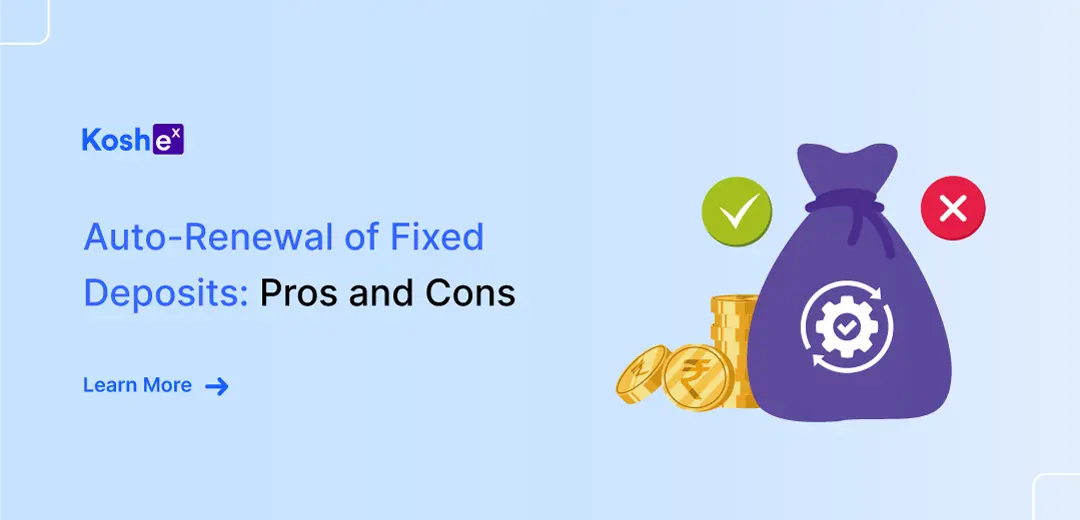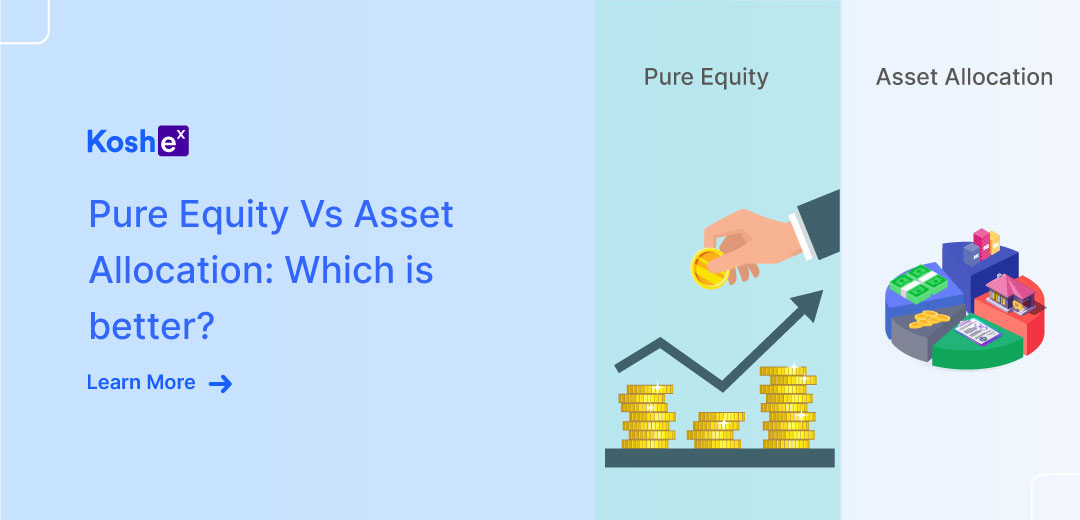What is a Long-Term Investment?
Long-term investments help investors build a sizable corpus to help achieve their financial goals – be it saving for the down payment of your house, buying a car, or retiring comfortably.
Some might find it difficult to stay invested for the long term but we are here to tell you why it is good for you and your money to stay invested for a long time.
Investing For The Long-Term
Investing your money for the long term might sound like a challenging game. It requires patience and discipline to put your money into an investment option for more than 7 to 10 years.
Usually, people invest in mutual funds for the long term to achieve their long-term goals such as their children’s education and marriage, saving for their house’s down payment, comfortable retirement, and so on.
Picking the right investment instrument for the long-term is highly crucial as if you go wrong here, you might end up making losses and not accumulate enough to fulfill your dreams.
So, it is important to not rely on one investment instrument but put your money in multiple asset classes to earn higher returns.
It is also important to understand your risk tolerance, so you don’t invest your money in highly volatile instruments and end up losing your initial investment.
Know Your Financial Goals
As we have mentioned above, you need to have a complete view of your financial goals before choosing to go on the long-term investment road.
You need to have a clear understanding and vision of your goals, so it is better to divide your goals into three broad buckets – short, medium, and long.
Your short-term goals will have a time horizon of six months to a year while medium-term goals will need three to five years to be achieved. Meanwhile, long-term goals have a time horizon of above ten years or more.
Once you know your goals and how many years you will be able to achieve them, you can choose a mutual fund based on that.
Why Should You Invest In Mutual Funds For The Long-Term?
When you invest in mutual funds for the long-term, you will get many benefits such as below:
The Power Of Compounding
Before you learn how the power of compounding can help you, you need to understand what compound interest is.
In compound interest, the interest gets added to the principal and helps in the accumulation of enormous interest. This resulting increase in your initial investment is called compound interest.
It is the magic that can grow your money to over ₹10,00,000 in only 25 years without making any new investments during this period.
If you place your investments strategically, compound interest can be your golden shot to a financially stable life.
Want to see how it works in real life? There are great tools that can help you with that. Koshex has an amazing Compound Interest calculator, which will help you understand how much corpus you will be able to build with a single lumpsum investment or multiple SIP payments in a mutual fund scheme. Meanwhile, this is the formula that you can use to calculate compound interest manually.
FV= PV *(1+i)n
In the above example,
FV = Future Value
PV = Present Value,
I = Rate Of Interest
n = Compounding Periods
Let’s see how compound interest works in real life.
| Year | Principal Amount | Interest Earned (at 12% per year) |
| 1 | 1,00,000 | 12,000 |
| 2 | 1,12,000 | 13,440 |
| 3 | 1,25,440 | 15,052.8 |
| 4 | 1,40,492.8 | 16,859.1 |
| 5 | 1,57,351.9 | 18,882.2 |
| 6 | 1,76,234.1 | 21,148.1 |
| 7 | 1,97,382.1 | 23,685.9 |
| 8 | 2,21,462.7 | 26,528.2 |
| 9 | 2,48,038.2 | 29,711.6 |
| 10 | 2,77,802.7 | 33,276.9 |
The above table shows how your initial investment of ₹1 lakh more than doubles in just ten years without making any new investments.
Compound interest arguably is the most influential force that can help you in accumulating wealth over time.
There are several stories of how lenders, businessmen, and merchants have used the power of compound interest for becoming and staying rich.
One of the best examples is that of Warren Buffett, one of the wealthiest people in the world, who leveraged the strategy of a business that involved compounding investment returns over a period of time.
What Should You Choose For The Long Term?
Equity mutual funds are a good investment option to consider if you are going to stay invested for the long term.
But why is that so? Because the equity market is highly volatile, especially in the short term. Thus, experts recommend sticking to your equity investment for as long as possible.
Investing in equity mutual funds or stocks with the mindset of following them through to the maximum tenure possible is known as a long-term investment approach.
If you are looking to stay invested in equity mutual funds for the long term, here’s how you can do it efficiently.
Start As Early As Possible
Most times, people start a SIP (Systematic Investment Plan) in equity mutual funds. So, it is a good idea to start an SIP as early as possible.
The earlier you begin, the longer you contribute and the longer your principal contribution earns returns. That means your returns compound for longer and therefore earn more returns.
Also, the longer your time frame, the more time you have for corrective action in case your investment goes against you. On top of that, time will automatically regulate your portfolio volatility, reducing your loss over time.
Opt For Growth Plans
There are two types of plans within mutual funds – Growth and Dividend plans. Growth plans reinvest your profits in the same scheme while dividend plans give your profits as dividends.
It is important to not fall for the regular payouts in the form of dividends.
Apart from withdrawing a part of your wealth, dividends also lower the compounding effect. If you choose a dividend plan and then reinvest the dividends at the same rate of yield, then your wealth will be neutral.
However, investors rarely do that. So, the better option is to choose growth plans where compounding is automatic. Growth plans create more wealth in the long run with lower levels of risk.
Be Regular With Your SIPs
We know that, when you invest in SIPs, you get more units during a market crash. So, people tend to wait for the market to decline to start an SIP. However, it is not a good idea to time your SIP.
Finding out the tops and the bottoms of the market is neither possible nor is it needed. It is a good idea to invest a fixed amount of SIP each month and then, just stick to it.
In this way, you can continue making more returns over a long period of time.
Monitor & Rebalance As Needed
The essential part of wealth creation is continuous monitoring and rebalancing of one’s portfolio. However, it is important to not overdo it.
Just because your portfolio has been in the red for a week doesn’t mean you have to rebalance it. There are three types of rebalancing that are required.
Firstly, when you are stuck in funds that are underperforming for a prolonged period of time, it is a good idea to put your money into better performers.
Secondly, you can consider temporarily reallocating part of your portfolio before key macro expectations such as interest rate shifts, macro shifts, inflation shifts, valuation shifts, etc.,
Thirdly, if your allocation to an asset class crosses a point, then you need to reallocate it back to the original levels. Apart from ensuring profit booking at frothy levels, this will also help keep your portfolio liquid when opportunities come up.
In The End…
Equity mutual funds are a great option for anyone who is considering staying invested for the long-term and if you are looking to invest in equity funds, you can head over to Koshex and create an account with us.
Creating an account takes less than 2 minutes and you can get started right away.
You can also track your expenses, manage your money and create a budget seamlessly with Koshex. All of this can be done for free.
Doesn’t that sound like a great deal? Having Koshex to manage your finances is like having a financial advisor in your palm all the time.
Sign up today!









Leave a Comment